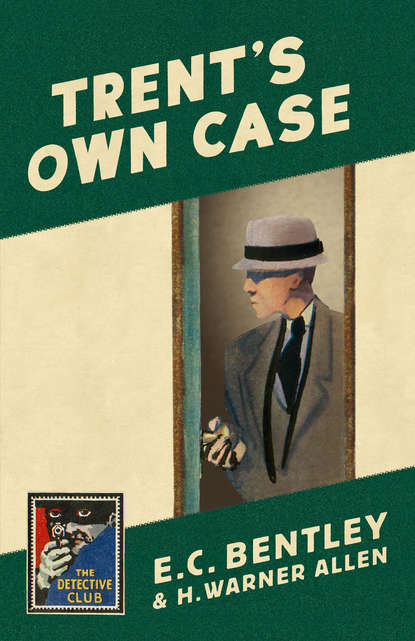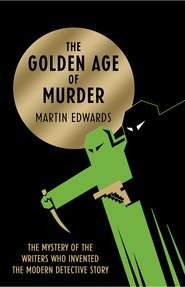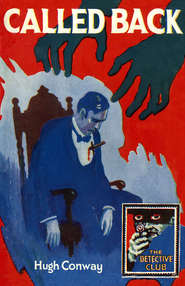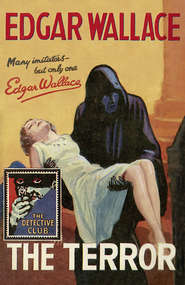По всем вопросам обращайтесь на: info@litportal.ru
(©) 2003-2024.
✖
Trent’s Own Case
Автор
Год написания книги
2019
Настройки чтения
Размер шрифта
Высота строк
Поля
Mrs McOmish, an elbow clasped in either hand, also came to overlook the proceedings of the visitor. ‘It might be a wee piece of coal,’ she opined, with more display of interest than she usually permitted herself. ‘We had the new coal in three days syne. It’s terrible good luck to pick up a wee piece of coal—or what is better still, an auld rusty nail. Only the nail maun be crookit, ye ken. Oh ay, it’s a nail; he’s putting it in his inside pouch. Twenty years, and mair, I’ve keepit a rusty nail I found just by the Tammas Coats statue in Dunn Square—Oh preserve us! What a loup he gave, Mr Trent, seeing ye at the window!’
‘His nerves must be in a shocking state,’ Trent said. ‘There’s never been anything frightening about me, has there, Mrs McOmish? The beasts that roam over the plain my form with indifference see; let alone the private secretaries of Congregationalist millionaires. Well, if he wants to see me, will you show him into the studio? It isn’t so maddeningly tidy in there.’ And Trent walked to the door communicating with that scene of his labours.
‘I wouldna wonder!’ the housekeeper said grimly. ‘Ye’ve been in it a full half hoor since ye came back.’ She went out to admit the visitor.
‘Mr Verney to see you, sir,’ Mrs McOmish soon announced in what she would have described as an English voice.
Mr Verney, whose age might have been guessed at twenty-seven or thereabouts, was a person of somewhat damaged aspect, for he looked harassed and distraught to the last degree. But there was nothing weak in the essence of his appearance. His frame was spare and athletic, his carriage erect, and in his fresh-coloured eagle-featured face there was a pair of restless bright-blue eyes that did not give an impression of spiritual sloth.
It was he who spoke the first words as his hand met Trent’s in a rather perfunctory salutation.
‘What do you think,’ he said earnestly, ‘of this terrible news?’
‘What do you mean?’ Trent said. ‘I haven’t heard of any terrible news, believe me, my dear fellow. I only hope it’s not too bad—for you.’
Verney stared at him intensely. ‘How can you have missed it?’ he demanded, with a puzzled look in his very expressive eyes. ‘It’s been in all the early afternoon papers—it’s all over the town. Or do you mean that old James Randolph’s death doesn’t distress you at all?’
Trent was thoroughly taken aback, and for the best of reasons. Himself, at a little after six o’clock the evening before, he had left the same James Randolph not only alive but in a furiously bad temper, a picture of choleric vitality. ‘Randolph dead!’ he said blankly. ‘Why, did he have a stroke or something?’
‘A bullet was what killed him, Trent,’ Verney said coldly. ‘I can’t conceive—’
‘Oh! he was shot!’ A light broke over Trent’s mind. ‘Now I understand. You see, Verney, I drove down to Glasminster to a wedding this morning, and I’ve only just got back after all the merrymaking. If anyone had heard of it down there, it wasn’t mentioned in my hearing. But the early editions! They all had it, of course—I see that now. But you know how they like to keep you guessing. On the way back, I should think I saw a score of bills saying that a well-known millionaire had been found shot. I didn’t care if fifty millionaires, each more well-known than the last, had been found shot. It never occurred to me that it was Randolph. My dear fellow, what a shocking thing! It must have been a bad blow for you, being what you were to him. Tell me what happened.’
‘That’s just what I can’t tell you,’ Verney said in a dull tone. He sat with hands clasped between his knees, and stared at the floor. ‘All I know is he was shot by someone last night in his bedroom at Newbury Place, when nobody else was there—it’s the evening his manservant always had free every week. The man found his master lying dead when he came home, and at once sent for the police. You cannot imagine the shock the news was to me—I didn’t even know Randolph was in London. The first I heard of it was when a C.I.D. man called on me early this morning, to see if I knew anything that could give them a line. All I could say was that the old man hadn’t an enemy in the world, as far as I knew. And I said the last I had seen of Randolph had been last week, when I was staying at Brinton Lodge, having various matters to talk over with him; and that then he had seemed quite at ease and free from any anxiety. Since I heard the news I’ve been living in a sort of bad dream. I had a very real feeling for the old man; more like veneration than anything else. And this means more of a chaotic smashup than you can very well imagine. At last I took to walking aimlessly about the streets, just to take the edge off my nerves; and when I found myself near your place, I thought I would look in for a talk. I suppose you had not seen Randolph lately?’
Trent looked at his visitor consideringly. What he had just been told by Verney made one thing clear: he, Trent, must have been one of the last persons to see Randolph before his being murdered. And he had strong reasons for wishing that interview of his with the old man to remain a private affair. It had concerned the reputation of a woman for whom he had a deep regard; and it had been of a decidedly unpleasant, not to say scandalous, nature. The less said about it the better, in Trent’s judgment; above all, to those with whom Randolph had left an honourable memory. As for the police, of course they must be told; for one thing, the information would set a limit in one direction on the time during which the murder had been committed. But Trent saw no reason for taking Verney into his confidence.
‘It is some time since I saw him,’ Trent therefore replied, with more truth than candour. ‘It’s no use offering you a drink, is it?’ he asked; and Verney shook his head. ‘Very often a cigarette helps you to pull yourself together,’ Trent went on. ‘You look all to pieces. Try one of these.’
Verney looked up gratefully. ‘Thanks, I will,’ he said, extending a shaking hand towards the box held out to him, ‘I know all about tobacco and what it can do to you, though it’s long enough since I smoked any.’ He lit a Virginia cigarette and inhaled deeply. ‘You see, the first year at Oxford I used to smoke a lot too much, as so many freshers do. Then, when I began to have dreams of a Blue, I dropped it altogether.’
‘And you got your reward, I dare say.’
Verney smiled, in momentary forgetfulness of the day’s bad news. ‘Do you take an interest in that sort of thing? Yes: three-mile; also cross-country running, since we are on the subject.’
‘No, I know nothing about it,’ Trent said; ‘but as soon as you spoke of dreaming of a Blue, I could see that your dream had probably come true. You look like a Blue. When Nokes outdares Stokes in azure feats, you know, it often marks him for life.’
Verney’s dejection again took possession of him. ‘Well, it came in useful when I began working for Randolph,’ he said. ‘The boys’ club part of the job was what always appealed to me most. You know about the Randolph Institute, I dare say. Nothing sectarian; just educational and social and athletic. I love it—in fact, I spend most of my time there, because there’s a room I use as a sort of general office for all Randolph’s charitable affairs. And of course, having a bit of a record in athletics gave me more influence with the lads than almost anything else could have done. Then my being a non-smoker was a good thing too, you see. You can hardly imagine the state that many of these young fellows get their respiratory tracts into with eternally smoking cheap fags. And as for running, there’s simply nothing like it for our sort of lads, so long as they’re sound physically—hard exercise in the open air, easy to fit in after the day’s work, and costs next to nothing.’
‘It’s good for you,’ Trent said. ‘You get all the exercise you need, I expect.’
‘All I need—yes. But to tell you the truth,’ Verney said, rather in the manner of one confessing to a secret vice, ‘since I began playing golf about five years ago, I prefer a round of that to any other open-air sport I know—and I have had a pretty good experience. Whenever I can manage it, I go off for a game to Matcham. It’s not a good course, and you often can’t get a caddy, but then I never want one; and it is the cheapest golf I know this side of London, which is what I have to consider. How I wish—but it is no use talking about that. As far as keeping fit goes, I have every opportunity, as you say. There’s nothing like running, above all, for that.’
‘There’s a good deal, no doubt,’ Trent said, ‘in having that sort of thing managed by someone who knows all about it.’
‘Yes,’ Verney said simply, ‘there is, of course. The boys have their committee; but they leave the whole show to me really, and I’m rather proud of the way our fellows have come forward since I took over. Last January the Randolph Athletic Club was runner-up in the Middlesex cross-country team championship, and challenged Southgate Harriers pretty closely. We provided the first two men home in that event, and we won the junior race easily. And now, I suppose’—he tossed the end of his cigarette into the fire—‘the Kilburn Institute’s all over and done with.’
Trent felt a moment of keen sympathy, for Verney’s whole manner was that of a heartbroken man.
‘Do you mean that his death really means the end of all that work?’ he asked. ‘Wasn’t there any endowment? Or surely there would be some provision in his will for the keeping-up of the various organizations he had started—what was that phrase he was so fond of using?—for the benefit of the community. I should think, from what I’ve heard, that the shutting-up of that Institute would pretty well amount to a social disaster for that part of London. It ought not to be possible.’
‘Well, it is,’ Verney said, as he accepted another cigarette. ‘You see, Trent, old Randolph had a rather strange side to his character as a public benefactor. He made a great fortune fairly early in life, and he devoted almost the whole of his income to charities and public objects. He continued to heap up more money; but I think it was because he could hardly help it. The real hobby of his life was to attend personally to all his enormous expenditure on charities and public objects. Sometimes he would give a great sum for some special purpose; but when he did that, it was always in the way of capital expenditure. He would build and equip a sanatorium, say, for some town or some big charitable institution; but he would never settle anything on it. He might, and usually did, put his name down year by year for a contribution to its upkeep; but he used to say he started a place like that as an opportunity for charity on the part of other people.’
Trent nodded. ‘That’s not unusual, I know,’ he said. ‘But how about places like the Institute? I always understood that was entirely his own private show, maintained by him exclusively. He surely can’t have left it high and dry, so to speak.’
‘That is just what I was coming to,’ Verney said. ‘The position of the Institute was just as you say—he held it in his own hands entirely, financing it as if it were a part of his own household. And he had other establishments on just the same footing, like the Randolph Infant Orphanage at Bishopsbridge, or the Randolph Mental Hospital at Claypoole. He was very proud of them, too, and saw to their being the best run places of their kind in the country. They cost him something, Trent; I’m telling you, and I know. But they never had a penny of funds of their own; and whatever Randolph parted with in any sort of way, he always would know what happened to it. He couldn’t seem to bear the idea of anyone else controlling wealth that he had amassed—that was at the bottom of it. And I don’t see that you could find fault with that, seeing that he did devote all those vast sums to other people, and put himself to a vast amount of trouble in looking after the spending of the money. But the unfortunate consequence is that now—’ he raised a hand, palm-downwards, and brought it down sharply on the arm of his chair.
Trent stared at him. ‘You don’t mean to say he’s made no bequests to these places that he created, and lavished money on, and that made up a large part of his reputation?’
Verney arose and crossed his arms. ‘I mean this,’ he said harshly. ‘Randolph made no bequests at all. He left no will.’
CHAPTER VI (#ulink_c8d6118d-66bc-50ec-bbf7-aa723ea127f3)
AN ARREST HAS BEEN MADE (#ulink_c8d6118d-66bc-50ec-bbf7-aa723ea127f3)
THERE was a momentary silence as Trent took in this amazing statement and its implications.
‘The man who murdered Randolph,’ Verney said, ‘has probably killed half a dozen invaluable charities and other good works stone dead with that same bullet. Besides that, he has dried up completely a great stream of benevolence that spread itself out in all directions. For I am convinced that there is no will; and if there is no will, what is to happen to the Randolph fortune, and to the causes that it supported, heaven alone knows. Somebody will inherit, I suppose; but there will be delay, and who can answer for what he will do with the money? He may prefer horse-racing, or yachting, or play-producing, or any other way of getting rid of money by the cartload. One thing is practically certain; he won’t live on a few thousands a year, and devote the rest to well-directed benevolence.
‘Another thing,’ Verney went on, holding up an expository finger. ‘There may be rival claimants, and a dispute dragging on indefinitely; for as far as I know Randolph had no near relations. You may have heard that he had a son, an only son, who disappeared from home when he was about sixteen, and has never been heard of since. The old man did everything possible to find out what had happened to him, but no trace of him was ever found and he was given up for dead long ago. But there may be other relatives. You see what a disaster the whole thing is likely to be, apart from the personal loss of such a man, and such an influence for good.
‘There is one detail,’ Verney went on after a moment’s pause, ‘of interest to you. Randolph was very anxious that you should paint a replica of the Tabarders’ portrait of him, to be hung in the hall of the Institute. Did you hear about that?’
‘I had a note from him about it,’ Trent said, ‘but nothing was settled.’
‘Well, it never will be now,’ Verney said; and then broke out desperately: ‘I tell you, Trent, the shock and the horror of this business, and the prospect of so much wreckage, have driven me pretty nearly insane.’ And Verney sunk his head between his hands, his fingers clutching his hair.
Trent, while his lips took a dubious twist, put a hand on the young man’s shoulder. ‘Better not meet trouble half-way,’ he said. ‘After all, the whole thing depends on your belief that Randolph had made no will. What grounds are there for thinking that he could have been guilty of such an amazing piece of imprudence as that? It’s really hardly credible.’
Verney, without looking up, shrugged his shoulders. ‘The grounds for thinking so are good enough, unfortunately. The fact is that, at the time of his death, he was really thinking, for the first time, about putting his affairs in order. His lawyers had been dropping hints for a long time that it was high time he made a will. I told him so myself, too, more than once—it was my obvious duty to do so, I thought, though a very unpleasant one. Whenever I did, he made it quite clear that there was no will as yet. He used to say there was time enough, that he was good for many years yet. But he hated the subject being mentioned—didn’t like the idea of dying, I suppose, like many other people; though if any living being had a right to feel confident about his prospects in the next world, Randolph had. And then at last he did begin to consider the thing seriously. Several times he said things that showed me he was thinking about the disposal of his estate. And then, before he had got to the point of doing anything definite, he was struck down.’
Trent thought for a few moments before saying: ‘Still, he may have made a will earlier in life—when he was married, for instance. Men usually do, I believe.’
Verney made a gesture of impatience. ‘He may—yes; when he was a comparatively poor man with no great philanthropic interests to think about. But if he did, I think he would have mentioned it; and anyhow, it’s not to be supposed that the terms of any such will would prevent everything getting into the sort of hopeless mess that I’m thinking about. Then, apart from his own foundations, there are all the causes that had expectations as regards Randolph’s estate—had a right to have them, I mean, seeing that for years he had been a regular and generous supporter of them.’
‘What sort of things do you mean?’ Trent asked. ‘Never having been a philanthropic millionaire, it would interest me to know how it all works—if you won’t think I’m being irreverent to say so.’
Verney looked into vacancy, as one assembling his ideas. ‘Why,’ he said, ‘to put it the simplest way, there must have been dozens of secretaries and chairmen of committees trying, at odd times, to sound me discreetly about what Randolph’s testamentary dispositions were. There’s the Humberstone General Infirmary; and the Humberstone Endowed Schools Foundation; and the Moss Lane Congregational Church of the same place; and the London Missionary Society; and the British and Foreign Bible Society; and the Yorkshire Congregational Union; and the Congregational Pastors Retiring Fund; and Leeds University; and the Scalbridge United Independent College; and the National Lifeboat Institution; and the Harrowby Seamen’s Institute; and the Dewsby Deaf and Dumb Institute; and—oh! I could name another dozen or more that have a direct interest in what happens to Randolph’s estate.’
‘Thanks! Thanks!’ Trent said smiling. ‘You needn’t go on, Verney, I see how it is. I’d no idea your field of work was such an extensive one. It’s no business of mine, of course, but I’m afraid this is going to be a serious thing for you personally.’
Again Verney shrugged. ‘It will send me hunting another job, after over two years of such a job as I shall never get again. But I’m not worrying about that just now. I want,’ he said savagely, ‘to see the man who killed Randolph taken and hanged—the cowardly brute who shot a defenceless old man in the back, and cut short a life that was given up to works of mercy and humanity. I suppose they’ll run the fellow down, Trent—you understand these things. It’s not likely he’ll escape, do you suppose?’
‘No, not likely,’ Trent said. ‘It does happen of course, now and then. But you have to give the police a reasonable allowance of time when a murder has been undiscovered for a good many hours, as I gather from what you tell me.’
Verney nodded. ‘Yes, naturally. I suppose it must depend on the traces left behind by the murderer—the weapon, footprints, fingerprints, the kind of thing one reads about.’
‘If he was careful,’ Trent pointed out, ‘he need not have left any traces at all. Criminals often don’t; but they may easily get found out all the same. Do you remember exactly what it was that was given out to the papers this morning?’










